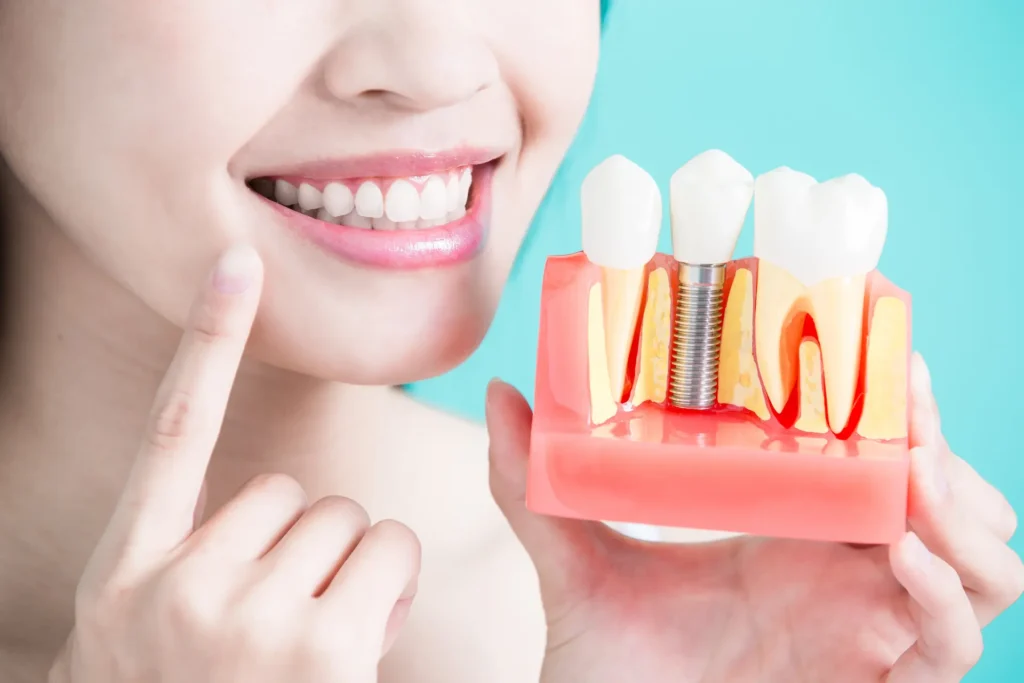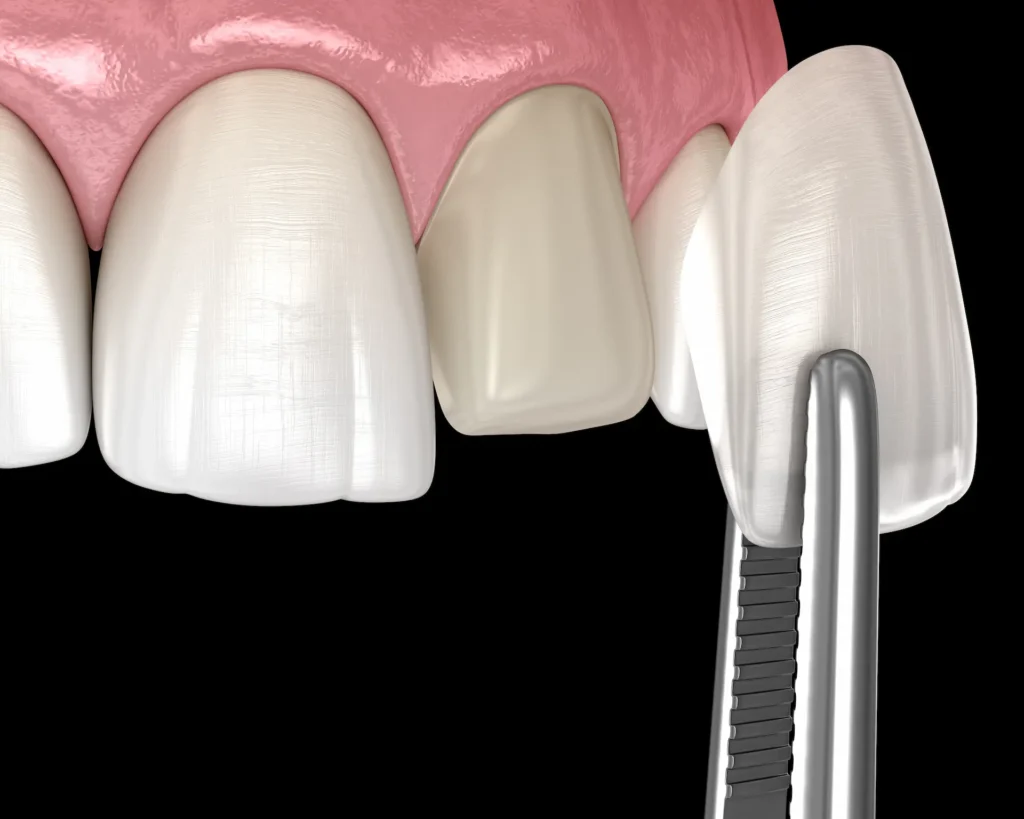Choosing between dental implants and veneers can be overwhelming, especially when faced with dental concerns that need effective solutions. Whether you’re grappling with tooth loss, cracks, discoloration, or other dental issues, finding the right path to restoring your smile is essential.
In this article, we’ll discuss dental implants vs. veneers, their pros and cons, differences, and the procedures involved in getting either. This will help you make an informed choice that aligns with your specific needs and concerns.
What Are Dental Implants?
Dental implants are surgically implanted into the jaw to restore your ability to chew properly and give you a new smile. They are like artificial tooth roots made from strong materials placed into your jawbone, helping to hold replacement teeth in place. If you’re missing teeth, dental implants can be a great option.
What Are the Pros and Cons of Dental Implants?

Dental implant systems comprise a fixture and abutment, often accompanied by an abutment fixation screw. The dental implant fixture is surgically positioned within the jawbone to replace the tooth’s root. Subsequently, the dental implant abutment is typically connected to the fixture using the abutment fixation screw. This abutment extends through the gums into the oral cavity, supporting the artificial teeth.
Dental implants feel stable, like real teeth, and can last long if you care for them. Plus, they keep your jawbone healthy.
Here are some of the pros and cons of dental implants:
| Pros | Cons |
| A natural appearance and feel | Surgical procedure and recovery time. |
| Long-lasting and durable | Higher upfront payment |
| Improved chewing and speaking ability | Requires good oral hygiene |
| Preserves adjacent teeth | Not suitable for everyone |
| Stimulates jawbone for bone health | Potential risk of infection |
| Low maintenance | Has the potential for implant failure |
| Boost self-confidence | Requires adequate bone density |
| Prevents facial sagging | It may require multiple appointments |
| High success rates |
The suitability of dental implants depends on various factors such as your oral health, bone density, and overall medical condition, and the decision to get dental implants should be based on a thorough evaluation by a dental professional.
Consulting with a dentist or oral surgeon is crucial to determine if implants are the right choice for you.
What Are Dental Veneers?
Dental veneers are like super-thin covers for your teeth. They’re designed to fix small problems, such as chips or stains. Unlike dental implants, which are like new tooth roots, veneers are more about making your teeth look nicer rather than fixing how they work.

What Are the Pros And Cons of Dental Veneers?
Dental veneers are thin shells made from materials like porcelain or composite resin that are custom-made to fit over the front surface of teeth. They are often used to improve the appearance of teeth that are misaligned, discolored, chipped, or uneven. Here are some pros and cons of dental veneers.
| Pros | Cons |
| Instantly improve smile appearance | Irreversible procedure |
| Corrects various cosmetic issues | Vulnerable to chipping or cracking |
| Minimally invasive procedure | Veneers may not be suitable for severe issues |
| Stain-resistant and natural looking | Potential for increased sensitivity |
| Requires minimal removal of tooth enamel | It has a limited lifespan and may need replacement |
| Can address gaps, discoloration, and more | It may not be covered by dental insurance |
| Short treatment process | Cost can be relatively high for a solution that is not long term |
| Customizable to desired shade and shape | Requires proper oral hygiene |
| Boost self-confidence | Temporary sensitivity after placement |
Differences Between Implants And Veneers
Dental implants and veneers are dental procedures used to improve the appearance and functionality of teeth, but they serve different purposes and involve distinct processes. Here are the key differences between dental implants and veneers:
Dental Implants:
- Function: Replace missing teeth by surgically implanting a titanium post into the jawbone.
- Material: Typically made of titanium for the implant post and porcelain or ceramic for the crown.
- Usage: Address functional tooth loss and provide stability for dental restorations.
- Durability: Highly durable and can last a lifetime with proper care.
- Invasiveness: More invasive surgical procedures with longer recovery time.
- Eligibility: Requires adequate bone density for successful placement.
- Cost: Higher upfront cost but potential long-term cost-effectiveness.
- Suitability: Suitable for individuals with one or more missing teeth.
Dental Veneers:
- Function: Thin shells placed on the front surface of existing teeth to enhance appearance.
- Material: Usually made of porcelain or composite resin.
- Usage: Primarily address cosmetic concerns like discoloration, chips, or gaps.
- Durability: Less durable compared to implants, may need replacement over time.
- Invasiveness: Non-invasive procedure with minimal tooth enamel removal.
- Eligibility: Suitable for individuals with primarily cosmetic concerns.
- Cost: Generally lower cost compared to dental implants.
- Suitability: Not suitable for addressing functional tooth loss or severe structural issues.
Both options serve specific purposes and cater to different dental needs. The choice between dental implants and veneers depends on your situation, goals, and a dental professional’s recommendation.
When Should You Choose Dental Implants?
Dental implants are a great solution for missing teeth, as they improve your ability to chew and enhance the appearance of your face. The process involves a minor surgical procedure where the implant is inserted into your jawbone. It requires some time for the implant to fuse with your bone and become a natural part of your dental structure.
Here’s what happens when you get a dental implant:
- Implant Placement: To get an implant a dentist gently places a small metal root into your jawbone to get an implant. It’s like planting a strong foundation.
- Time to Bond: The metal root needs some time to become part of your bone. This process is called osseointegration.
Dental implants might be the way to go if you’re missing teeth and want a strong, natural-looking solution. Always talk to a dentist first to know if they’re the right choice for you.
When to Choose Dental Veneers
Consider dental veneers to be miniature makeovers for your teeth. If your teeth have minor problems such as stains or chips, veneers can greatly enhance their appearance. It’s akin to providing your teeth with a brand-new appearance.
Here’s how dental veneers work:
- Preparing Your Teeth: The dentist will gently reshape your teeth to prepare them for the veneers. It’s like getting them all dressed up.
- Applying the Veneers: The veneers are super thin, like stickers. The dentist attaches them to the front of your teeth, making them look smooth and beautiful.
If you’re looking for a cosmetic boost for your teeth, veneers might be the answer. They’re a quick and easy way to transform your smile, but they cannot be used to replace missing teeth. Remember to see a dentist before deciding if veneers are the right choice for your smile goals.
Making the Right Choice for You
Choosing between a dental implant and a veneer is a difficult decision. The good news is you don’t have to figure it out alone! Your dentist knows what fits best.
Here’s what to keep in mind as you make your decision:
Talk to a Dentist: Before you decide, chat with a dentist. They’ll listen to your wants and help you choose what’s best for your smile.
Common Concerns: Some people worry about pain or cost. Don’t be afraid to ask your dentist about these things. They’ll explain everything so you know what to expect.
Maintenance: Both implants and veneers need adequate care. Ask your dentist how to care for them so they last a long time.
With the guidance of a dental expert, you’ll find the perfect fit for your teeth and your goals. Your smile begins with the understanding that your dentist is your trusted guide.
Need Help Choosing Between Dental Implants vs. Veneer?
Dental implants are permanent solutions to fixing missing teeth and can provide a stable and secure restoration for oral health, while veneers are perfect for giving your smile a fresh appearance.
If you have missing teeth and are considering dental implants or veneers, it is important to consult a professional for personalized advice. Hanna Dental can evaluate your needs and provide the best solution for restoring your smile.
FAQs: Frequently Asked Questions
Q: Is it better to get veneers or implants?
It depends on your needs. If you’re missing teeth, implants can be great for function. If you want to enhance your appearance, veneers are a great choice.
Q: Do celebrities get dental implants or veneers?
Dental implants and veneers are popular among celebrities. They get implants for tooth replacement and veneers for a stunning smile.
Q: Which lasts longer, veneers or implants?
Dental implants usually last longer, often a lifetime, with good care. Veneers can last 10-15 years or less.
Q: Are dental implants stronger than veneers?
Yes, implants are stronger as they replace tooth roots. Veneers are thin and more for appearance.



